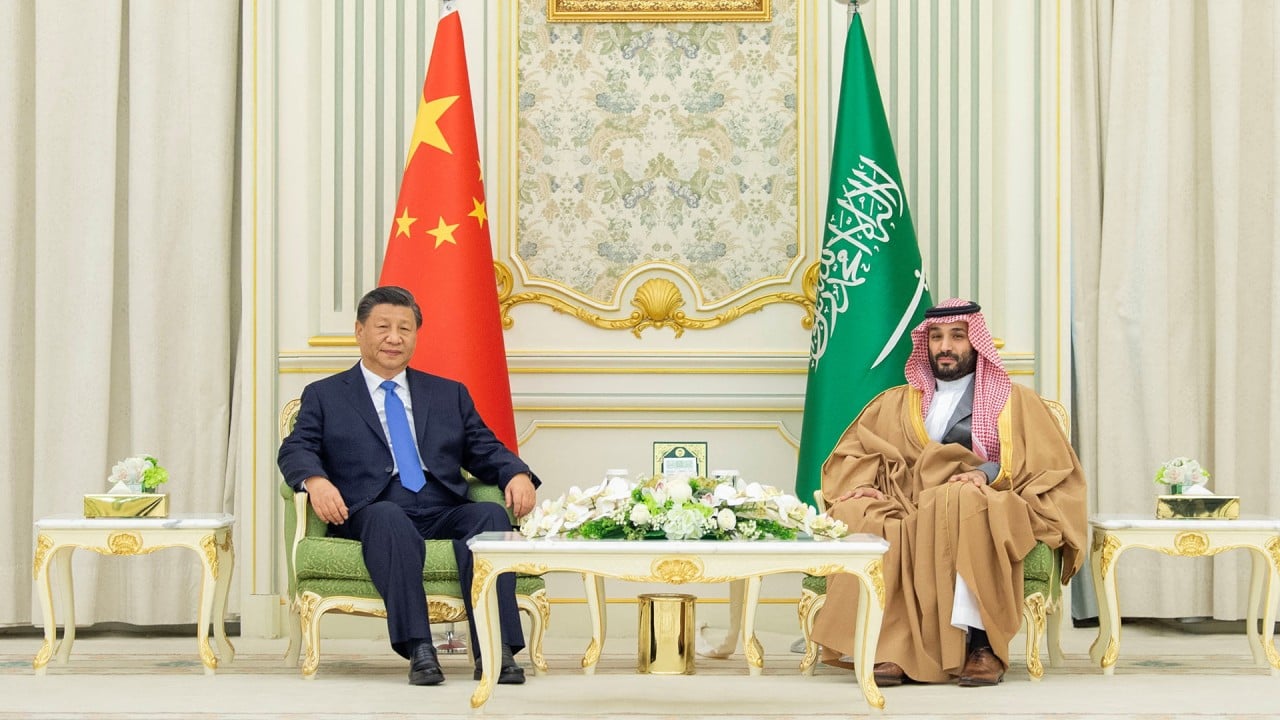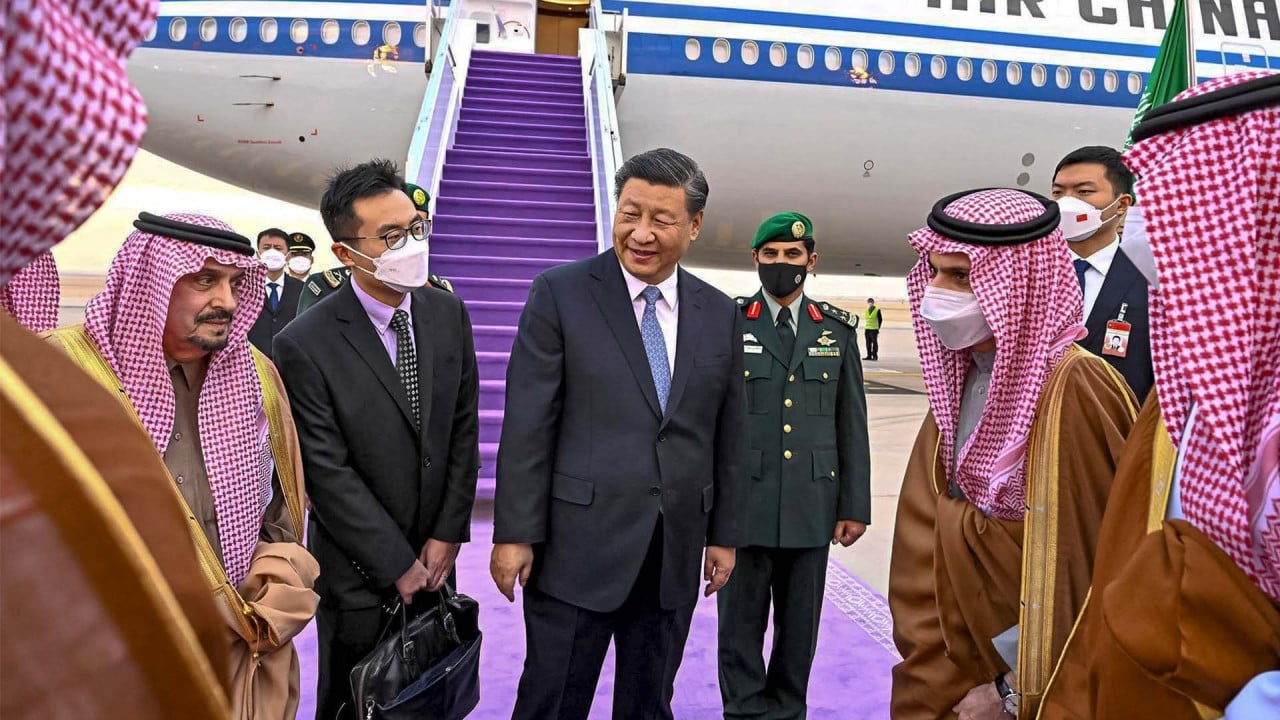
China and Saudi Arabia pledge to widen ties to ‘all fields’ and work together on Iran nuclear programme
- President Xi Jinping and King Salman pledge to upgrade relations in a joint declaration during the Chinese leader’s visit to Riyadh
- The two sides looks to go beyond energy cooperation and into areas such as technology, infrastructure and security
Friday’s declaration stressed the importance of continuing cooperation in “all fields” and deepening their relations within the framework of a comprehensive strategic partnership established in 2016.
Xi and King Salman agreed to enhance the comprehensive strategic partnership to include a biannual meeting between the two heads of state, and upgrade regular high-level talks from vice-premier to premier level.
The declaration included a joint statement on Iran, Riyadh’s long-time rival and a strategic partner of Beijing. The two agreed to work together to guarantee the “peaceful nature” of Iran’s nuclear programme and called on Iran to maintain a “non-proliferation regime” while emphasising “respect” for the principles of “good- neighbourliness”.
Li Shaoxian, a Middle East affairs specialist at Ningxia University, said China’s position on Iran’s nuclear programme had been consistent in supporting its peaceful use as a source of energy but opposing proliferation.
“Ensuring the peaceful use of Iran’s nuclear programme is an international consensus. I don’t think there’s anything wrong with saying this in the joint declaration,” he said.
China seeks to boost Saudi ties as Arab summit announced
Gedaliah Afterman, head of the Asia policy programme at the Abba Eban Institute for International Diplomacy at Israel’s Reichman University, said China’s focus on developing relations with US partners such as Saudi Arabia was “at Iran’s expense”.
“While Iran remains important to China, including in respect to its superpower competition with the United States, it is increasingly focusing its efforts and resources on its relationship with Saudi Arabia, the UAE, both important US allies, and other Gulf Council Cooperation members at Iran’s expense.”
With the relations between Riyadh and Washington deteriorating over issues such as oil production and the murder of the journalist Jamal Khashoggi, members of Congress have been calling for Washington to suspend arms sales to the kingdom for a year.
Meanwhile, the Saudis have been diversifying their sources of weapons, reportedly agreeing to a US$4 billion deal with China at last month’s Zhuhai air show.
Further security cooperation was promised in the joint declaration, including enhanced communication and information exchange on combating terrorism and cybercrimes.
The document also included a pledge to develop hi-tech industries such as AI, and Xi’s meeting with Saudi Crown Prince Mohammed bin Salman, the country’s de facto ruler, on Thursday included a deal between Riyadh and the Chinese tech giant Huawei to provide cloud computing services.
Is the US row with Saudi Arabia driving Riyadh into the arms of China?
Saudi Arabia also expressed its intention to attract Chinese expertise to help with future mega-projects.
On energy, the two sides said theirs was an “important strategic partnership”, and stressed the importance of “stability” in the global oil markets. They also agreed to cooperate on developing new and green energy sources, including an MoU on hydrogen energy.
They also agreed to support each other’s core interests, including on sovereignty and territorial integrity, with the crown prince expressing support for the one-China policy in his meeting with Xi.
In total the two sides signed 46 agreements and memorandums of understanding covering different fields during Xi’s visit, his first to the region since 2016.
Li, from Ningxia University, said Xi’s visit to Saudi Arabia was an “unprecedented” elevation of the two countries’ relations, with the agreements on mega-infrastructure projects such as the China-Saudi Arabia Jizan Industrial Park indicating the future direction of the relationship.
“This industrial zone will completely use China’s technology and equipment,” he said. “It is an industrial complex that covers all industries, energy, new energy, shipping, electric power and hi tech.”
Wang Jin, a Middle East affairs professor at Northwest University in Xian, said science and technology cooperation between China and Saudi Arabia had received a lot of recognition in recent years.
“Saudi Arabia will become the future bridgehead of cooperation between China and the Middle East world,” he said.
Afterman said that as China increased its footprint in the Middle East, it continued to calculate each step with the US in mind.
“The agreements signed so far play to China’s strength. It’s Beijing’s unique ability to provide both infrastructure and technology that is apt to play a larger role in its involvement in the Middle East,” he said.
“But despite the optics, and the flurry of MoUs, China is likely to remain cautious as it assesses the implications of recent developments in the Middle East. For China, the biggest question is whether or not current US global strategy, and in particular towards China, includes a US resurgence or withdrawal in the region.”

 - Kawala Xie.jpg?itok=NogZcyZ-&v=1661304068)


